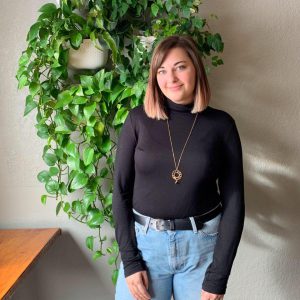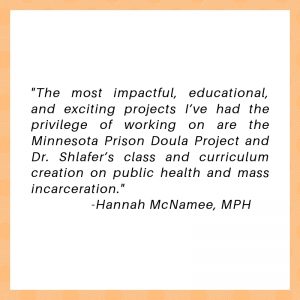This Student Spotlight series highlights the course experiences of students in the Incarceration & Health Course taught by Dr. Rebecca J. Shlafer. Other parts of the series include reflections from: Bri Warren, Martha Johnson, Jeanette Fernandez-Baca, and Rachael Mills.The following piece is a reflection written by Hannah McNamee (MPH ’19) about her MCH experiences and what she learned in the course.
Background and Previous Experience
Mass incarceration and the injustice of our country’s justice system isn’t something we are typically taught in public or religious school growing up. Many are likely taught that people who break the law deserve to be in prison, that prison and jail are a fair puni shment for breaking the law, and that the process and system of incarceration is just. At first, I had to pursue the truth on my own. During my undergraduate studies I took an interest in incarcerated mothers and completed a long research paper on the effects of maternal incarceration on children. This assignment sparked an interest in me that fueled a subsequent investigation into the ways in which our justice system is in fact, unjust. I explored the way it serves as a replacement for slavery, locking up, putting to work, and disenfranchising millions of indigenous, black, and other people of color. I explored the way it separates families, provides inadequate care to women, trans, and nonbinary folks, and the way it perpetuates cycles of generational trauma and poverty in marginalized communities. I’ve also explored the ways it has helped some people, in desperate need of a safe place with resources for change and healing. Exploring this work at the University of Minnesota (UMN) has offered me all of these perspectives and more.
shment for breaking the law, and that the process and system of incarceration is just. At first, I had to pursue the truth on my own. During my undergraduate studies I took an interest in incarcerated mothers and completed a long research paper on the effects of maternal incarceration on children. This assignment sparked an interest in me that fueled a subsequent investigation into the ways in which our justice system is in fact, unjust. I explored the way it serves as a replacement for slavery, locking up, putting to work, and disenfranchising millions of indigenous, black, and other people of color. I explored the way it separates families, provides inadequate care to women, trans, and nonbinary folks, and the way it perpetuates cycles of generational trauma and poverty in marginalized communities. I’ve also explored the ways it has helped some people, in desperate need of a safe place with resources for change and healing. Exploring this work at the University of Minnesota (UMN) has offered me all of these perspectives and more.
Coming to the University of Minnesota’s School of Public Health, I was eager to find other students and professors who were interested in the topic of public health and incarceration. Before even starting my first semester I had the opportunity to apply for a research assistantship with Dr. Rebecca Shlafer, whose research focuses on understanding the developmental outcomes of children and families impacted by incarceration. Although I was not awarded the research assistantship, Dr. Shlafer asked to meet with me to discuss my interests. It was during this meeting that I decided to align myself as much as possible with Dr. Shlafer and her work – cut to two years later, and I have now been involved in numerous projects, classes, and events involving mass incarceration, at-risk families, justice involved girls and women, children’s health, and reproductive justice. Two of the most impactful, educational, and exciting projects I’ve had the privilege of working on are the Minnesota Prison Doula Project and Dr. Shlafer’s class and curriculum creation on public health and mass incarceration.
Working with the MnPDP
The Minnesota Prison Doula Project (MnPDP) provides pregnancy and parenting support for incarcerated pregnant people and mothers. This support is offered through trained doulas along with group-based education and support. The project operates throughout the state at both county correctional facilities and in the Minnesota Correctional Facility – Shakopee. Part of Dr. Shlafer’s work involves providing research and evaluation services for MnPDP. When I met with Dr. Shlafer the first time, she couldn’t offer me a position on her research team but she connected me to the director of MnPDP in order to get involved in some of the operations and administrative projects. Over the course of a year I had the opportunity to write several high dollar grants in order to secure funding for the project and I attended a legislative hearing in Wisconsin regarding an anti-shackling bill backed by MnPDP. I was exposed to the day-to-day operations of a growing organization and made connections to my classwork by observing and helping with critical processes like coalition building, grant writing, community engagement, and systems change. Along with other students and staff involved in the project, I attended several conferences and meetings, including conferences on girls and women in justice and the collateral consequences of incarceration, including the National Prison Doula Training, hosted by MnPDP.
About the Project and the Curriculum

Due to my relationship with Dr. Shlafer and my involvement in MnPDP, my interest in incarceration and its effect on health only grew during my first year in the School of Public Health. This past fall, I had the chance to learn even more and gain some tangible skills related to working with this specific and vulnerable population. As one of seven graduate students enrolled in Dr. Shlafer’s class on mass incarceration and public health, I had the privilege of facilitating one of the classes and working with the other graduate students to create a women’s health curriculum to be taught in Minnesota’s Correctional Facility in Shakopee (MCF–Shakopee). Throughout the fall semester we, along with the class of undergraduates, learned about the impacts and effects of incarceration on health from Dr. Shlafer and from touring several correctional facilities. It was extremely impactful to learn about different topics like mental health, reproductive health, juvenile justice, and ageing in prison, and then to actually see what it’s like for people incarcerated in Minnesota. Using the knowledge gained from this course, along with our own specific expertise and additional research, I and the other graduate students spent the semester preparing a health curriculum to be taught to women incarcerated at MCF–Shakopee. We will be teaching this course during the spring semester of 2019. It’s exciting to be able to apply everything I’ve learned about health and wellness, combined with my passion for working with people impacted by incarceration. Due to heavy security and processes, working with the DOC can be complicated and cumbersome. I am grateful to have the resources and support at the University to make this collaborative and important work possible.
Many people recommend choosing a specific topic or subject area early on in graduate school to commit to and fully explore during the pursuit of a masters. Although MCH is a unique department, offering the chance to explore many relevant topic areas, I believe I was right to align myself with Dr. Shlafer early on. By exploring incarceration for the past (almost) two years, I have been able to examine the issue from a multitude of angles. Even so, I am excited to continue learning as I embark on the upcoming semester, and in my post-grad life. I hope to work with this unique population in the future, and continue standing with those fighting for liberation and justice for everyone.
Hannah recently graduated from the University of Minnesota School of Public Health in the MCH Program. She spent her time focusing on sexual health, incarceration, and child development, with an emphasis on racial, economic, and health equity. Along with teaching the women’s health course at MCF-Shakopee, she also works as a research coordinator for the Center for Research in Family Home Visiting in the Department of Pediatrics at the University of Minnesota.
Read Student Spotlight Archives
Interested in learning more about getting a degree in Maternal and Child Health? Visit our MCH Program page for more information.
#UMNMCH #UMNproud #UMNdriven